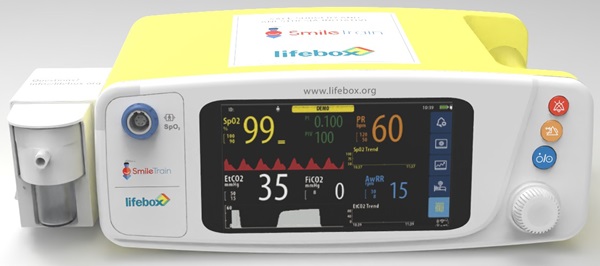
In a collaboration aimed at transforming surgical safety worldwide, Smile Train, the world’s largest cleft-focused organisation and Lifebox, a global nonprofit dedicated to safer surgery, are championing the integration of capnography as an essential anesthesia monitoring tool in global healthcare systems.
This week, Smile Train announced a substantial commitment to donate capnographs valued at over $300,000 to their partner hospitals worldwide. This move solidifies Smile Train’s total commitment to providing capnography at well over $600,000, underscoring the organisation’s dedication to advancing patient safety in surgical settings.
President and CEO of Smile Train, Susannah Schaefer expressed the organisation’s commitment to saving lives through the adoption of capnography. She highlighted the transformative impact of capnography in surgical settings and emphasised the need for professional societies and national health authorities to recognise it as an essential anaesthesia monitoring tool.
“We believe the inclusion of a capnograph by professional societies and national health authorities as an essential anaesthesia monitoring equipment in operating rooms will catalyze its adoption worldwide, ultimately saving countless lives,” said Schaefer.
A capnograph serves as a crucial tool for detecting a leading cause of anaesthesia-related complications and deaths in low-resource settings—the misplacement of the breathing tube supplying oxygen to the patient. This misplacement can lead to catastrophic harm, including brain damage and death, within minutes, particularly in children.
While capnography has been standard in operating rooms in high-income countries for over three decades, its availability is severely limited in most low-resource-setting operating rooms. Research indicates a 100 per cent gap between the need for capnography and its availability in low-income countries.
Director of programmes safety at Smile Train, Dr. Elizabeth Igaga highlighted the challenges faced in low-resource settings without capnography. She compared it to navigating a dark path without a flashlight, expressing the urgency to address this critical gap in patient safety.
“Including it on essential operating room equipment guidelines will revolutionise our approach to patient safety, allowing us to detect and respond to potential complications before they become life-threatening,” explained Igaga.
The absence of capnography in many low-resource settings is attributed to its high cost and the scarcity of devices tailored to specific local needs. In response, Smile Train and Lifebox collaborated to develop the Smile Train-Lifebox Capnograph—a high-quality, user-friendly, and affordable capnograph designed for use in low-resource settings. The initiative also created a comprehensive capnography training package for anesthesia providers.
This year, 350 Smile Train-Lifebox capnographs will be distributed in Benin, Ethiopia, the Philippines and Uganda. CEO of Lifebox Global, Kris Torgeson stressed the importance of making capnography a standard for surgical patient safety globally, advocating for its inclusion in operating room checklists.
“Capnography shouldn’t be a privilege; it should be standard for surgical patient safety everywhere, and it is needed now,” said Torgeson.
This collaboration marks a pivotal moment in the global effort to enhance surgical and anesthesia care, ensuring that no patient is left behind due to a lack of access to essential health technologies. The announcement was made during the 18th World Congress of Anaesthesiologists in Singapore, signifying a critical milestone in the collective efforts of global health stakeholders to improve patient safety during surgery.


